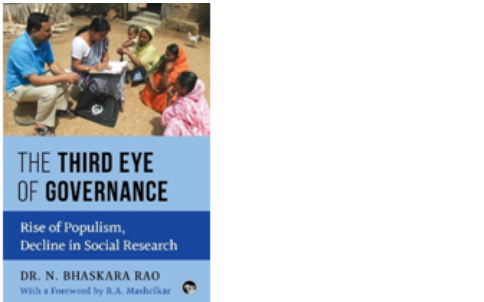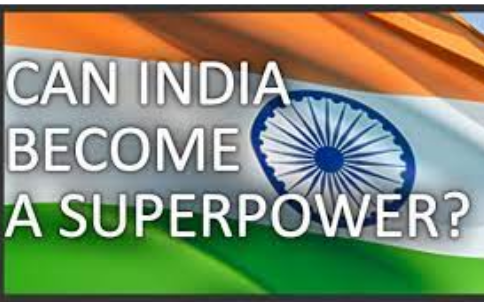Dr R. A. Mashelkar, PadmaVibhushan awardee, is one of India’s prominent scientist-technologist. He held highest positions of the country and was President of Indian National Science Academy and Chair of the Academy of Scientific and Innovative Research. I cherish a Forward he wrote for my latest book, “The Third Eye of Governance” (2021). In that he has several pertinent observations on public policy making in India. He hoped that my book “will lead to extensive introspection, debate and new solutions that can improve the extent and quality of research at all stages”. I brought out in that book how “data, statistics, analysis and research have become politically sensitive and contentious”. I continue to feel that one of the missing links in India’s 75 years growth path has been much-needed research back up and a shared rationale for public policies.
From being a country of poverty, illiteracy, communal violence and shortages in 1947, today, over 75 years later, India has come a long way. It is now a country of surpluses, with an indomitable manufacturing sector, an unparalleled educational base, state-of-the-art communication, health infrastructure, research institutes with pioneering track and a global competitive soft power. There may be many shortcomings, but this country in many ways is a remarkable success story. How was all this possible?

A major factor behind this was rich heritage, inquisitive mind of Indians and of course the Constitution. Credit also goes to political leadership, civil society, and the news media for their being part of the country’s larger pursuit and accomplishments. In this process, however, political parties have emerged as the final arbiters of policies and priorities – often overriding the citizen, the community and civil society.
Emphasis on independent research
As if it had foreseen such a situation, 70 years ago, the Nehru – Mahalanobis team developed the idea of field surveys, feedback, data and analysis as some kind of an interlocutor. They even wanted scientists, technocrats, and economists to work independently rather than on the terms of the politicians and bureaucrats. They believed that data from within – that is, from the same people who are responsible for the execution of policies (i.e., ministers and bureaucrats) – is not always objective. That was how they created capabilities and institutions for research, data gathering and statistics, with an emphasis on autonomy and provision for checks and balances. They realised the significance of independent and rigorous research not only for economic development but also for social development. This realisation and understanding of research potential helped in building a momentum for socio-economic transformation of the country. This was during the first 20-25 years of India’s independence. It was after that such a framework was neglected or undermined. Between 1970 and 2020, there has been a shift in the scope of research and priorities based on the changing concerns of policy makers at different points of the country’s growth path. With political parties dominating policies, there has been greater emphasis on winning election. This concern has become an undercurrent of research. This trend is becoming more evident with every election and in that process populism has become the pursuit, even in research. A result of this trend is “supportive research” of endorsement-kind. Populism obviously implies making people dependent on the government and reducing them to remain “beneficiary citizens”. This trend is one reason why India has not accomplished more and has not met the minimum development and sustainability goals established by the United Nations (for 2005-2030). It is important to understand this downward trend of recent decades.
Research is Essential
The US became a super power within 100 years of its constitution. Israel emerged as a superpower in less than four decades, despite being an entirely new country, very small in size. Japan rose to superpower status within a few decades of the Hiroshima and Nagasaki bombings. Modern-day Malaysia is another impressive example of transformation to prosperity. A common factor in these four nations, for example, is that they implemented a sound research system of course, in conjunction with hard work and visionary leadership. Considering what Indian professionals have accomplished and demonstrated outside the country, it leads to more questions. Why do the Indian youth excel and emerge at the top outside their own country? Don’t they get an opportunity to unleash their creative talent within India? Is something missing in the nation’s priorities? Why are we then not in the foreground in terms of socio-economic development, reducing inequalities, and emerging as a global power in research and development? It is the R&D leaderships that differentiate countries and their global status. India spends hardly one percent of GDP for R&D against more than three percent by Japan, Korea, US and Israel. But then it is not merely what percent is spent but how reliably and transparently research is carried and also availed by the authorities. Have we lost our way? In 2050, when our Republic becomes 100, what will be the status of people?
It is not that research has failed but the concerns and priorities of policy makers have changed which, in turn, is because electoral politics have become the driving force. While electoral politics are concerned with immediate motivation and outcomes, transformational plans require impact, evaluation, studies and feedback data and reliable research without individual motivations. Research is expected to be a safety pin of democracy, as academics and media are expected. Our planners and builders of modern India earlier considered research as a “Third eye” of stakeholders and ensure checks and balances idea a feasible and potential tool same way as the pillars of the State are.
Sanctity of numbers
“Development”, “welfare” and “empowerment” have to be experienced with sanctity of numbers. Fantasy of populism is seeing no limits with “public policies” becoming “publicity policies” or “policies for populism”. As a result, leaders, parties, Government and even more the news media have taken to surrogates. That is the situation we are in now. Are we sensitive? Can we expect “good governance” with such trends taking roots driven by instant “surveys”, “ratings” and such instant way! It is good that the new education policy at least talks of a research architecture.
My appeal to colleagues in academics of the country is not to remain aloof or ignore or be silent about the trends and their implications, immediate and distant the same way as they were about impact of TRP driven television, for example, or of “poll-doles” or of “welfare” schemes. How else impact and evaluation studies, independent and credible, can we ever expect. News editors and analysts need new sensitivities about credibility of data, statistics and research being referred instead of relying on surveys, ratings, rankings and such temporary, motivated or competition driven sources, irrespective of their allegiance. Such sources suit political priorities more, not news media. The sanctity of numbers today has to be a serious concern of news media, academics and active citizens going beyond political push and pull of the day.
(Dr N Bhaskara Rao is a research based analyst of public policies of over 50 years and author of over a dozen books.)





Excellent analysis of the current prevailing situation.
India is what it is today mainly due to the visionary foresight of Nehru whose developmental plans were based on education, scientific research, collaborative technological efforts and objective planning with proper data in assessing the needs and the output of efforts.
Today the basic organic research is neglected. One of the main reason may be due to the fallacy of thinking It is enough to utilize the results of research done by other economically advanced nations in order to improve the domestic productive capabilities. Also the needs of common people who vote for the opportunist politicians becomes the driving force of policy making at the top.